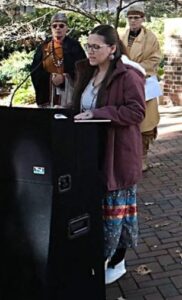
by James A. Bacon
Jasmine Anderson wants to enroll as a member of Virginia’s Pamunkey Indian Tribe. Her mother is a Pamunkey and Mattaponi, and her father a Chippewa, she says. But she’s been turned down three times, she claims, because her ancestors helped Black people in the 1860s. “It’s flat-out racism,” she claims, according to reports in the Richmond Times-Dispatch.
Anderson says her family has been excluded from the tribe since an ancestor built a school and church for Blacks following the Civil War. The RTD article traces the discrimination back to the Racial Integrity Act, Jim Crow-era legislation enacted in 1924 that prohibited Whites from intermarrying with Blacks or Native Americans, both of which were classified as “colored.” As if there weren’t enough trouble in the tribal paradise, Mattaponi chief Mark Custalow is being accused by his second cousin, Gloria Custalow, of barring women from voting and tribal leadership.
Both Pamunkey and Mattaponi restrict participation of women in voting, running for tribal leadership, or attending tribal meetings. Free and fair elections would end sex discrimination in tribal enrollment, contend tribal dissidents. (The tribal chiefs are not quoted in the article, so we don’t know their side of the controversy.)
What’s the big deal? Why has this become an issue now? Good Lord, there are only 200 or so members of the Pamunkey tribe and 300 enrolled members of the Mattaponi. Both tribes maintain small reservations on the Middle Peninsula north of the James River, but only a fraction of tribal members live on the reservations. Why is it not sufficient to “self-identify” as a Pamunkey or a Mattaponi and follow tribal traditions? Why the need to enroll?
Could it be that under U.S. law, federal recognition entitles a tribe to various legal benefits not available to other Americans? As soon as the Pamunkeys won their tribal recognition a few years ago, various hustlers and entrepreneurs descended upon the tribe with business schemes to take advantage of its new status. The Pamunkeys have advanced plans to build a broadband internet business on the Middle Peninsula, and, more recently, a casino in Norfolk. (An internet check indicates that the internet venture at this time is limited to supplying broadband to the reservation, but the casino project is a go.)
Published details of the casino project are minimal. The $500 million project will be financed and managed by outside parties and funneled through the Pamunkey, It is not known what the Pamunkeys are getting from the deal. For a scientific-wild-assed-guess, let’s assume that the casino generates $200 million a year in revenue and the Pamunkey tribe gets a 1% cut. That would be $2 million dollars a year. There are only 200 people enrolled in the tribe. The cut would amount to about $10,000 for every man, woman, and child.
That would be a pretty good incentive to want “in” on the tribe, and a pretty good incentive to keep tribal membership exclusive.
Whatever the actual numbers, tribal membership does (or could, if the ventures are successful) confer significant financial benefits. The more money that is at stake, the more likely it is that the struggle for power and control within the tribe will intensify.
So, the question becomes fundamental: How does one ascertain whether someone is a legitimate Pamunkey or Mattaponi? Clearly, it will not do to have people “self identify” as a tribal member. We’ll need objective criteria. Given the prevalence of Native-American intermarriage with both Blacks and Whites over the centuries, it’s not likely there are many “pure blood” Pamunkey or Mattaponi. One place to start the search for definitions might be the Racial Integrity Act, which defined “Indianness” as having at least one quarter Indian blood. As undesirable as it might be to legitimize a definition from the Jim Crow era, there’s no way around the question: How much Native American ancestry must one have in order to be considered Native American? How much Pamunkey ancestry must one have to be considered Pamunkey?
Is there an objective measure? Or does the allegedly self-perpetuating tribal leadership base the decision on wholly arbitrary and self-serving criteria?
Should there be official tribal registries? Should enrollment be backed up by genealogical research? Should DNA tests be deployed? Who should be the arbiter of any disputes?
These are serious questions. How we resolve the issue of Pamunkey tribal enrollment has implications for other disputes. Among Blacks, there is an increasing clamor among “African-Americans” with slave ancestry to distinguish themselves from African-Africans from, say, Nigeria, whose ancestors never experienced American plantation slavery (but may have experienced African forms of slavery), and even from Caribbean-Africans, whose ancestors were enslaved but not by Americans. Making the question even more complex is the reality that nearly all “African-Americans” have some White ancestors — White ancestry could run as high as 20%. Should African-Americans have an enrollment registry as well? If so, what mix of African and European DNA would be required to distinguish “African Americans” from both native-born Africans and Caribbean-born Africans?
Here’s a simpler solution: No ethnic/racial enrollments. No registries. No official, government-sanctioned definitions of tribes, races or ethnicities. Better yet, drop all government racial/ethnic classifications. With inter-marriage now common, so many Americans today have such mixed ancestry that the classifications are increasingly arbitrary and meaningless. As the saying goes, if you want to get rid of racism, stop fixating on race.

Leave a Reply
You must be logged in to post a comment.